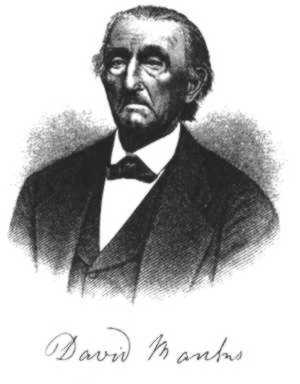DAVID BANKS
 Among
the noble band of worthy men whose names grace the pages
of this History none have been more bold in declaring
their honest convictions on all questions of moral or
religious reform than the subject of this sketch. He
is of English origin and was born in the town of Greenwich,
Fairfield Co., Conn., Aug. 11, 1794. His grandfather,
David Banks, was a Revolutionary soldier, was a shoemaker
by trade, and a man honored and respected. He died at
a ripe old age.*
Among
the noble band of worthy men whose names grace the pages
of this History none have been more bold in declaring
their honest convictions on all questions of moral or
religious reform than the subject of this sketch. He
is of English origin and was born in the town of Greenwich,
Fairfield Co., Conn., Aug. 11, 1794. His grandfather,
David Banks, was a Revolutionary soldier, was a shoemaker
by trade, and a man honored and respected. He died at
a ripe old age.*
David
Banks worked on the farm summers and attended the South Stanwich
district school winters until he was thirteen years of age,
when he commenced to learn the shoemaker's trade which his
uncle, Daniel Banks. The time thus spent at the district,
supplemented with eleven weeks sometime afterwards in studying
English grammar, laid the foundation for his education. Mr.
Banks has been a great reader and quite a logical thinker,
and today has one of the best-informed minds in the town.
At the early age of eight years he received religious impressions
by the earnest prayers of a faithful schoolteacher, which
took deep root, the result of which has been an earnest Christian
life, devoted to God and the cause of humanity. On the 1st
of January, 1815, he united with the Congregational Church
at Stanwich, Conn., and at the present time, is a member
of the Church of the Puritans of New York City.
He
succeeded his uncle Daniel as the proprietor of the shop
at twenty-one years of age, having in the mean time become
somewhat noted as a first-class shoemaker, making a specialty
of good fits on fine boots and shoe. His business increased,
and he was compelled to hire two men to assist him. he commenced
business in the same house where he first saw the light of
day, and remained there until 1828 or 1830, when he settled
where he now resides.
He
built his present house on temperance principles in 1826
or 1828, it being the first house in the town put up without
the use of rum at the raising. As a characteristic of his
well-known termperence principles, even in those early days,
we mention that when his head carpenter came to him and sac
that the men would not work without rum, he replied that
the timber could lie and rot before one drop of rum should
be brought on his premises. He stuck to his vow, and the
result was his house put up all right, and no one was injured.
He continued at his trade until 1860, since which time he
has been a farmer."
On
the 10th of May, 1821 he married Matilda, daughter of Rev.
David Peck, of Greenwich, Conn. She was born May7, 1797,
and died June 17, 1879. She was a devoted wife and an affectionate
mother. Their children were as follows: Zaccheus, Cornelius
(deceased), Ann (deceased), David (deceased), Alpheus (deceased),
Augustus, Elethen, Sarah H., and Mary E.
Mr.
Banks has always been an outspoken, bold, antislavery
man, and his own house has often been opened for prayer
and public meetings to discuss the slavery question, even
when the church was barred against such meetings; but time
has wrought a wonderful changed and such a change. In
politics he was a Free-Soiler and Whig till 1856, when he
became a staunch Republican, and in November, 1880, voted
for Gen. Garfield, of Ohio, for President of the Unite States.
In
1840 he voted the Liberty ticket, having James G. Birney
for President and a Mr. ------ Earle for Vice-President.
There were only about seven thousand votes cast for this
ticket in the United States in 1840, but this small party,
under different times, has grown until its principles are
well known and felt throughout the length and breadth of
our vast domain, and in 1880 elected the ripest scholar and statesman that
ever graced the Presidential chair.
Mr.
Banks has been very liberal indeed, having given more than
two thousand dollars to aid the missionary cause, besides
doing his part for home interest."



